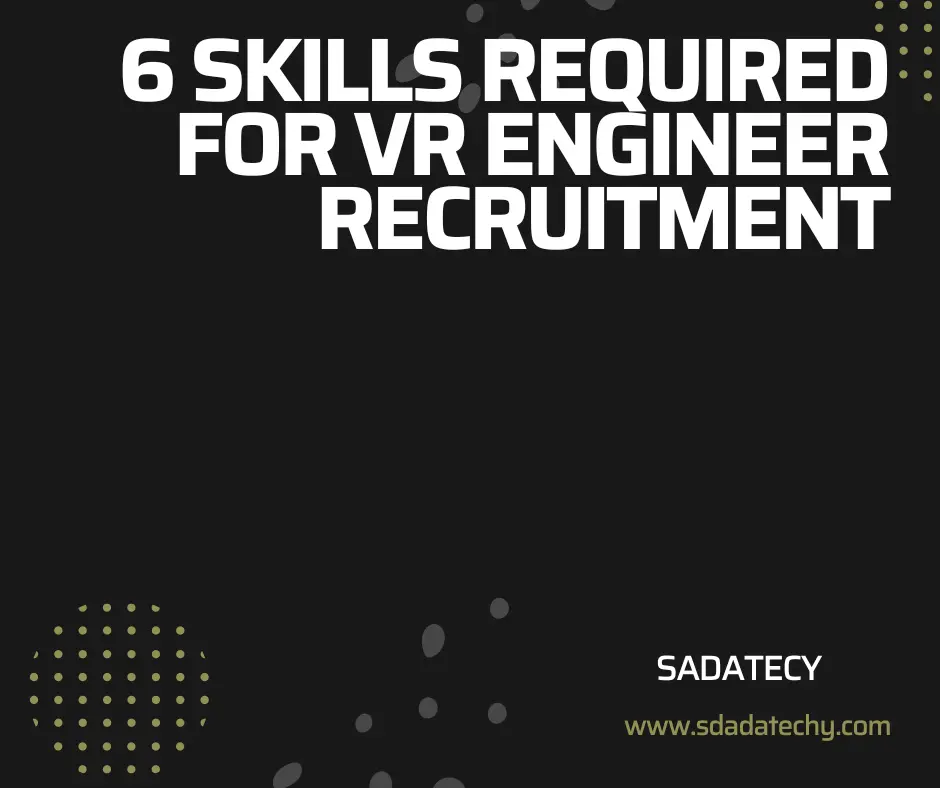To begin, let’s define a virtual reality engineer.
VR stands for “virtual reality” and is an acronym for that term. As for “VR engineers,” they are those who create VR technology and its associated tools. Programming games and other VR-based content is where most VR engineers put in their time.
There has been a rise in the popularity of virtual reality (VR) in recent years because it provides users with the opportunity to see realistic graphics in a variety of contexts.
Duties of a Virtual Reality Engineer
VR engineers deal mostly with live-action footage, computer-generated imagery, and augmented reality in their job (augmented reality). The video in augmented reality is a hybrid of real-world footage and computer-generated imagery.
Virtual reality (VR) technology is being utilized to provide potential homebuyers with a full tour of a room’s contents on real estate websites.
In addition, computer graphics are employed in many types of games and visuals, and virtual reality has found increasing application in entertainment centers in recent years.
Job Openings for VR Engineers
There aren’t a lot of openings for VR engineers, but the market for their services has been expanding in recent years, and the average salary they may anticipate is satisfactory. Some virtual reality engineers make more than 8 million yen per year, although the typical salary is between 4.5 and 6.5 million yen.
As virtual reality is still in its infancy, it is safe to assume that the need for VR engineers will grow steadily over the next few years.
Virtual reality (VR) developers of the future
Virtual reality (VR) technology is already being put to use in many different contexts, and its usefulness is only anticipated to grow. It is also expected that a surge in the number of businesses producing virtual reality content would occur simultaneously if 5G is widely used. Therefore, it’s safe to say that the outlook for VR engineers is bright.
However, there aren’t too many people with expertise in VR engineering since it’s still a new technology. Thus, it is not impossible to get work in the field of virtual reality engineering even if you lack relevant expertise.
Master your craft and you may shoot for a yearly salary of 10 million yen or more.
The Top 6 Skills Virtual Reality Engineers Need to Have
Those who have always had a passion for gaming and those who are interested in video-related technologies are just two examples of the kind of individuals who could be interested in hiring VR engineers. In addition, some of them could be curious about the prerequisite knowledge and abilities they’ll need to fill out a job application.
Therefore, what are the necessary abilities for a career as a VR engineer? Listed below are six competencies needed to work as a virtual reality (VR) engineer.
(1) Capabilities in video game creation
Virtual reality is employed extensively in the gaming industry, from home consoles like the PlayStation VR to arcades and other entertainment venues. Therefore, it is safe to say that a background in game development is essential when looking for virtual reality engineers to hire.
Therefore, if you’re interested in game creation, you need to make sure you know how to use game production tools like Unity and Unreal Engine. Here, we’ll acquaint you with each of them individually.
Unity
Unity, created by Unity Technologies, is a gaming engine that can be used to create both 2D and 3D games. In addition to its widespread usage in the creation of mobile and internet games, Unity is often a required ability in postings for virtual reality (VR) engineers.
Additionally, Unity offers game production with user-friendly controls, and it is also employed in the creation of mobile games like Pokemon GO and Shironeko Project.
A Real Engine
Epic Games’ Unreal Engine is a superior alternative to Unity for creating photorealistic 3D video games. Japanese video game franchises including Final Fantasy, Dragon Quest, Kingdom Hearts, and Tekken all employ the Unreal Engine.
Keep in mind that Unreal Engine knowledge may be included as a must in certain job ads.
proficiency in computer programming
Candidates for virtual reality engineers should have experience with game-development-friendly programming languages. The above-mentioned game engine makes it possible to create games without having to write any code at all.
However, coding experience is not optional; if you want to apply for this position, you’ll need to demonstrate proficiency in the development languages listed in the advertisement, such as JavaScript, C++, and C#, all of which are well-suited to the creation of video games.
JavaScript
JavaScript is a popular choice for building web applications and is essential for designing dynamic web pages.
As a VR engineer, you should be aware of this language since it is often used for development on the web and is sometimes even required as a development language for video game design positions.
JavaScript is a simple language to pick up since it does not need to set up an environment.
C++
C++ is an enhanced version of C that also supports object-oriented development. Fast-processing games, mobile apps, and online services are just a few of the many places it finds usage.
Additionally, Unreal Engine uses the C++ programming language, therefore learning C++ is crucial for making games using Unreal Engine.
C#
Microsoft created the C# programming language, which is centered on objects. Even though it is a C language, it has many similarities with Java and has a structure that is more similar to Java than C.
In addition, Unity employs C#, thus familiarity with the language is a must if you want to create games using Unity. Sometimes the finer features of a game made in Unity are written in C#.
Accuracy with a gun
Virtual reality (VR) content creation in the live-action industry sometimes requires the shooting and usage of photographs, hence the ability to shoot is frequently a need for VR engineer employment in this industry.
Typically, 360-degree cameras are utilized to capture the live-action visuals used in VR experiences. Sometimes another person in charge of shooting does the work, but sometimes the VR engineer does the shooting themselves.
So, you need to know how to shoot, and that includes knowing how to handle a camera.
Proficiency in video editing
As was previously noted, 360-degree live-action photographs are used in VR live-action entertainment. In addition, the recorded video may be utilized for VR material after being edited to remove any irrelevant segments.
Therefore, the ability to edit videos is also necessary for a career as a VR engineer. Keep in mind that, unlike in other technical fields, VR engineers will require experience recording and editing video.
Gathering information effectively is skill number five.
When compared to other fields, virtual reality is both relatively young and technologically mature, with new developments occurring often. In recent years, virtual reality games have seen a dramatic rise in quality.
Engineers need information gathering skills since new technologies develop daily in the IT business; however, recruiting VR engineers will also demand information gathering skills relevant to VR.
Able to effectively convey information 6
There’s a common misconception that VR developers sit in a dark room and do their work in isolation. While a team, we talk to one another as we go about our business.
Therefore, it is important for companies looking to hire VR engineers to look for candidates with the kind of communication abilities often associated with a citizens of the modern world. Let’s put on our communication hats so we can all get along at work.
The Virtual Reality Engineering Certification Test
Taking the “VR engineer certification test” is a must if you desire a career in virtual reality engineering. The Japan Virtual Reality Association offers two distinct “theory course” and “application course” options for its VR engineer certification test.
To sit for the test, prospective VR engineers must first attend a certification course designed to provide them with the skills they’ll need in the field.
The title of “Senior Virtual Reality Specialist” might be yours if you do well in both the theoretical and practice courses.
A senior virtual reality engineer certification is advantageous in the job market since it demonstrates a candidate’s expertise in the field and motivation to work in the field.
Why not take both tests if a job as a Virtual Reality (VR) engineer is your goal?
There are three routes rookies might take to become virtual reality engineers.
Virtual reality (VR) engineers might vary in experience, but not everyone has what it takes to become one. If you lack experience but would still want to work in virtual reality (VR), you’ll need to learn the abilities that employers look for in candidates.
So, how does one go about becoming a VR engineer without prior experience? For those of you who are VR engineering novices, we have outlined three approaches you may use.
Studying by Oneself
The VR programming and game engine abilities you need may be learned independently from books. Even if you have to teach yourself, you can learn all you need to know about game creation if you’re already passionate about the subject.
However, if you are not adept at studying alone, you should probably look into other options since it is tough to retain drive when self-studying and there is a danger of setbacks if you slip.
Tip #2: Sign up for a course on Udemy
Udemy is a great resource if you want to master the VR engineering skills necessary to get a career in this field. You may find introductory Unity courses and other types of online education programs on Udemy.
Virtual reality (VR) and augmented reality (AR) abilities necessary for VR engineer careers, as well as the ability to construct 360-degree VR panoramas, may be learned on Udemy, allowing users to obtain relevant practical knowledge.
#3: Join a study group
Attend a study session if you’re interested in learning the skills necessary to work as a virtual reality (VR) engineer. Unity tutorials for newcomers have been conducted in recent years, and workshops for learning VR and AE technologies have also been organized.
To that end, it’s a good idea to join a virtual reality (VR)-related study session if one is being offered in your area. Motivating yourself to study is easier when you’re surrounded by peers who share your study style in a study group.
Learn what Virtual Reality engineering positions expect of their applicants.
It’s generally agreed that VR will only grow in popularity over time, therefore careers for VR engineers seem to be promising. And because there aren’t many VR engineers around at the moment, you can probably get work even if you have no relevant expertise.
Why not begin your career as virtual reality (VR) engineer by learning the necessary trade skills and earning the appropriate credentials?
For more details catch us on Facebook


